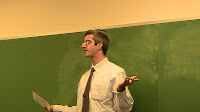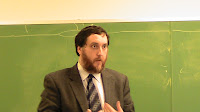 Yesterday was day two of YCT's Yemei Iyun in Bible and Jewish Thought (having attended day one, as well), the only full day of the program.
Yesterday was day two of YCT's Yemei Iyun in Bible and Jewish Thought (having attended day one, as well), the only full day of the program.The first session I attended was Leeor Gottlieb's "An Overview of Tehillim: Tempestuous Textual Transmission". I would say that Leeor Gottlieb is on my list of my three favorite presenters at the Yemei Iyun. I enjoyed listening to him last year at one session and some of his audio on the YCT website in the Yemei Iyun section. He spoke on some of the textual transmission issues, but interestingly not only pointed out that אלקים is a general description (i.e. a god) and that the tetragramatton is more of a proper noun (God/Lord), but also pointed out that in one section of Psalms there is a greater intensity of the former than the latter. For those folks interested in Psalms, this is worth downloading (even though the downloads are free) when it gets uploaded.

The second session I attended was Rabbi Menachem Leibtag's "What Is the Purpose of The Temple?", although he wasn't speaking on this topic generally, but rather in the context of the book of Kings. I realized my sense of the history of kings was definitely in need of going back into the Bible to get a better sense.
The third session I attended was
 "Halakhic Sections in Devarim and Applications in Nakh: When Conflicts Arise in Interpretation", presented by Rabbi Hayyim Angel. This was interesting as he presented a tension between interpreting things in the Bible whether on the level of reading the Bible as an explainer of the text versus as a halakhic decisor - definitely not easy.
"Halakhic Sections in Devarim and Applications in Nakh: When Conflicts Arise in Interpretation", presented by Rabbi Hayyim Angel. This was interesting as he presented a tension between interpreting things in the Bible whether on the level of reading the Bible as an explainer of the text versus as a halakhic decisor - definitely not easy.
The fourth session I attended was Rabbi Eric Levy on "The Second Generation: Bemidbar 20-35". I actually hadn't planned on attending this session initially, but after hearing him the day before, I decided to go hear him again. He spoke about some of the differences between the first generation in the desert and the second - including talking about what Moses' sin or non-sin was, which was good (definitely download it when it goes on the YCT website).

The fifth [and last] session I attended was Elana Flaumenhaft speaking on "The Ceremony on Har Grizim and Har Eival", in which she discussed a variety of different aspects of it. At the end, she spoke of a colleague's comparison between that ceremony and revelation at Mt. Sinai, which was great, primarily about the earlier ceremony being more passive and the later one more actively involving the Israelites.
No comments:
Post a Comment